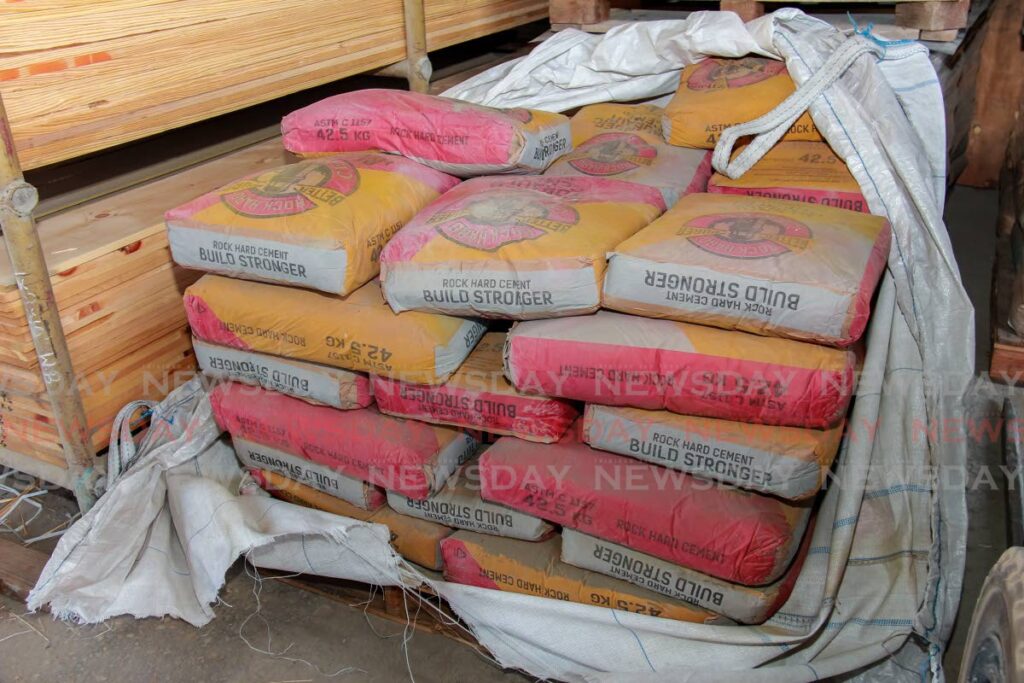Rock Hard loses cement tax increase challenge

THE MINISTRY of Trade and Industry says it continues to actively monitor market conditions in the domestic cement market and will make any policy adjustments required to “effectively and fairly balance the economic and social needs of Trinidad and Tobago with the interest of consumers.”
The ministry’s assurance came in a statement on Thursday acknowledging the judgment of the Caribbean Court of Justice (CCJ) as it dismissed a challenge by St Lucia-based cement importer Rock Hard Distribution and its two former affiliates from TT.
On Wednesday, the St Lucia-based cement importer lost its legal challenge over the move by Trinidad and Tobago’s government to increase taxes on imported cement.
In its decision, the Caribbean Court of Justice (CCJ) dismissed Rock Hard’s application which complained of the 50 per cent increase in import duties on cement and all its arguments in support of it.
Rock Hard approached the CCJ to have reviewed the decision of the Council for Trade and Economic Development (COTED) of Caricom to grant TT’s request to suspend the Common External Tariff (CET) of five per cent on imports of other hydraulic cement and impose the 50 per cent rate from January 1-December 31, 2021.
The Government also imposed a quota on the import of other hydraulic cement.
The claim at the CCJ was supported by Rock Hard’s local importer, Rock Hard Distributors and Mootilal Ramhit and Sons Contracting Ltd.
Rock Hard closed its TT business in September, last year, blaming it on the imposition by the Government of “continuous challenges” to its doing business here. It, however, continues to operate in other Caribbean islands.
In its application at the CCJ, the companies argued that the imposition of the 50 per cent import duty would have a deleterious effect on its viability and sustainability. They challenged the legality of the COTED decision, maintaining it was “flawed” and jeopardised trade expansion with other countries (Rock Hard’s cement was imported from Turkey) nor was there consultation.
It was also Rock Hard’s contention that COTED wrongly allowed TT to impose a tariff rate for other hydraulic cement far beyond their World Trade Organisation (WTO) bound rate of five per cent.
The Government, Caricom, and the two interveners, the Government of Belize and local cement producer Trinidad Cement Ltd disagreed with Rock Hard’s position and also challenged the court’s jurisdiction to decide the issue of the compatibility of the COTED decision with WTO law.
In their ruling on the latter, the CCJ judges held that it did have jurisdiction to decide whether and to what extent the WTO law was part of Caricom’s law and whether, on interpreting the Revised Treaty of Chaguaramas (RTC), it was bound by the trade organisation’s law.
The CCJ held that in relation to the setting of tariff rates, Caricom was “not so bound,” and although it was expected that COTED would have regard to the WTO-bound rate when called on to make decisions on the suspension or alteration of the CET, it did not restrict its powers under Caricom law.
The court pointed to its previous ruling in the 2009 case of TCL against Caricom, in which it held that in CET matters, COTED had a broad discretion and the court will only interfere with a decision if it was found to be “manifestly wrong.”
In Rock Hard’s challenge, the CCJ said there was no basis COTED’s decision could be successfully challenged or annulled. It also said while there were some flaws in the way the prescribed procedure in approaching COTED, they were not sufficient to “vitiate” the decision to allow TT to impose the increased tariff.
Rock Hard was also faulted for not participating in consultations with the Government although the CCJ judges did say the process between the parties “could have been more fulsome and more transparent.”
Attorneys for the Government had submitted that serious attempts were made to consult with Rock Hard even before it came to a final position on the increase of the tariff or the imposition of the quota.
And on Rock Hard’s argument that the decision prejudiced the expansion of trade with countries outside of Caricom, the CCJ rejected it, saying that was but one objective but, inherently, it was Caricom’s intent to create a protected market for producers and manufacturers within the community.
It also noted that the RTC did not cover the importation of products from third-party State but the articles of the treaty made limited references to the importation of goods or products “of community origin.” The judgment said a CET was generally meant to offer some level of protection to producers and regional traders.
The CCJ judges presiding over Rock Hard’s application were Justices Jacob Wit, Winston Anderson and Maureen Rajnauth-Lee. They have asked for submission on costs to be filed in 14 days. In July 2021, Rock Hard was also unsuccessful in its lawsuit against the Trade and Industry Ministry’s move to introduce the licensing scheme for cement importers and the national cap on the annual importation of cement at 75,000 tonnes.
Like the new CET increase, the quota and import licensing registration system went into effect on January 1, 2021 for a year. That ruling has since been appealed and is before the Court of Appeal.
Rock Hard and its local distributors were represented at the CCJ by attorneys Ian Benjamin, SC, Jagdeo Singh, Justin Phelps, Karina Singh and Nalini Jagnarine.
The TT Government was represented by attorneys Deborah Peake, SC, and attorneys Tamara Toolsie, Brent James and Radha Sookdeo, Appearing for Caricom were Dr Corlita Babb-Schaefer and O’Neil Francis,
Trinidad Cement Ltd was represented by Senior Counsel John Jeremie, SC, and Raphael Ajodhia while the Government of Belize was represented by Senior Counsel Eamon Courtenay and Samantha Matute-Tucker.

Comments
"Rock Hard loses cement tax increase challenge"